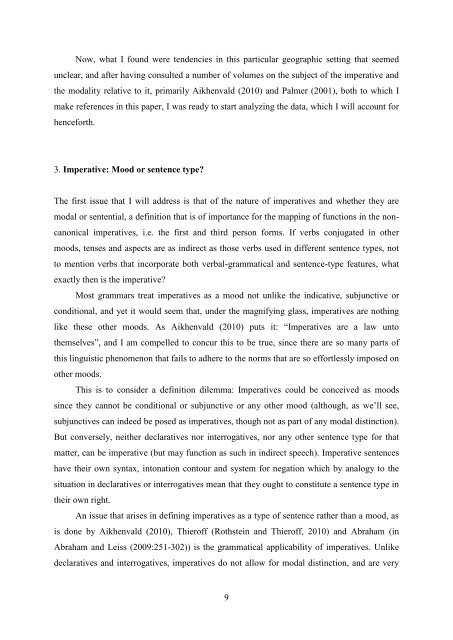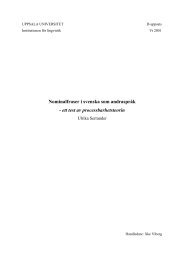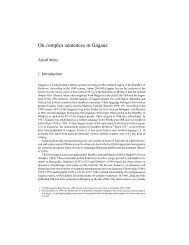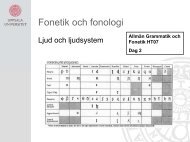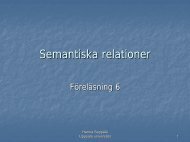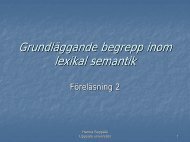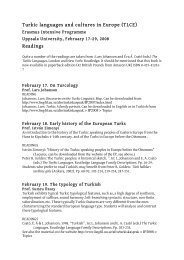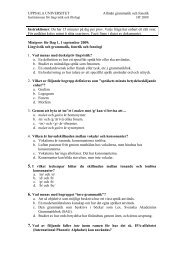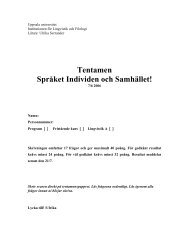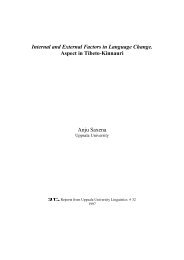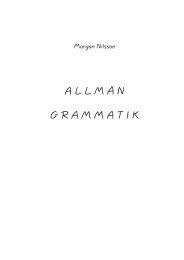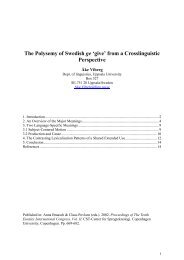The function of non-canonical imperatives in the languages of Europe
The function of non-canonical imperatives in the languages of Europe
The function of non-canonical imperatives in the languages of Europe
You also want an ePaper? Increase the reach of your titles
YUMPU automatically turns print PDFs into web optimized ePapers that Google loves.
Now, what I found were tendencies <strong>in</strong> this particular geographic sett<strong>in</strong>g that seemed<br />
unclear, and after hav<strong>in</strong>g consulted a number <strong>of</strong> volumes on <strong>the</strong> subject <strong>of</strong> <strong>the</strong> imperative and<br />
<strong>the</strong> modality relative to it, primarily Aikhenvald (2010) and Palmer (2001), both to which I<br />
make references <strong>in</strong> this paper, I was ready to start analyz<strong>in</strong>g <strong>the</strong> data, which I will account for<br />
henceforth.<br />
3. Imperative: Mood or sentence type<br />
<strong>The</strong> first issue that I will address is that <strong>of</strong> <strong>the</strong> nature <strong>of</strong> <strong>imperatives</strong> and whe<strong>the</strong>r <strong>the</strong>y are<br />
modal or sentential, a def<strong>in</strong>ition that is <strong>of</strong> importance for <strong>the</strong> mapp<strong>in</strong>g <strong>of</strong> <strong>function</strong>s <strong>in</strong> <strong>the</strong> <strong>non</strong>ca<strong>non</strong>ical<br />
<strong>imperatives</strong>, i.e. <strong>the</strong> first and third person forms. If verbs conjugated <strong>in</strong> o<strong>the</strong>r<br />
moods, tenses and aspects are as <strong>in</strong>direct as those verbs used <strong>in</strong> different sentence types, not<br />
to mention verbs that <strong>in</strong>corporate both verbal-grammatical and sentence-type features, what<br />
exactly <strong>the</strong>n is <strong>the</strong> imperative<br />
Most grammars treat <strong>imperatives</strong> as a mood not unlike <strong>the</strong> <strong>in</strong>dicative, subjunctive or<br />
conditional, and yet it would seem that, under <strong>the</strong> magnify<strong>in</strong>g glass, <strong>imperatives</strong> are noth<strong>in</strong>g<br />
like <strong>the</strong>se o<strong>the</strong>r moods. As Aikhenvald (2010) puts it: “Imperatives are a law unto<br />
<strong>the</strong>mselves”, and I am compelled to concur this to be true, s<strong>in</strong>ce <strong>the</strong>re are so many parts <strong>of</strong><br />
this l<strong>in</strong>guistic phenome<strong>non</strong> that fails to adhere to <strong>the</strong> norms that are so effortlessly imposed on<br />
o<strong>the</strong>r moods.<br />
This is to consider a def<strong>in</strong>ition dilemma: Imperatives could be conceived as moods<br />
s<strong>in</strong>ce <strong>the</strong>y cannot be conditional or subjunctive or any o<strong>the</strong>r mood (although, as we’ll see,<br />
subjunctives can <strong>in</strong>deed be posed as <strong>imperatives</strong>, though not as part <strong>of</strong> any modal dist<strong>in</strong>ction).<br />
But conversely, nei<strong>the</strong>r declaratives nor <strong>in</strong>terrogatives, nor any o<strong>the</strong>r sentence type for that<br />
matter, can be imperative (but may <strong>function</strong> as such <strong>in</strong> <strong>in</strong>direct speech). Imperative sentences<br />
have <strong>the</strong>ir own syntax, <strong>in</strong>tonation contour and system for negation which by analogy to <strong>the</strong><br />
situation <strong>in</strong> declaratives or <strong>in</strong>terrogatives mean that <strong>the</strong>y ought to constitute a sentence type <strong>in</strong><br />
<strong>the</strong>ir own right.<br />
An issue that arises <strong>in</strong> def<strong>in</strong><strong>in</strong>g <strong>imperatives</strong> as a type <strong>of</strong> sentence ra<strong>the</strong>r than a mood, as<br />
is done by Aikhenvald (2010), Thier<strong>of</strong>f (Rothste<strong>in</strong> and Thier<strong>of</strong>f, 2010) and Abraham (<strong>in</strong><br />
Abraham and Leiss (2009:251-302)) is <strong>the</strong> grammatical applicability <strong>of</strong> <strong>imperatives</strong>. Unlike<br />
declaratives and <strong>in</strong>terrogatives, <strong>imperatives</strong> do not allow for modal dist<strong>in</strong>ction, and are very<br />
9


